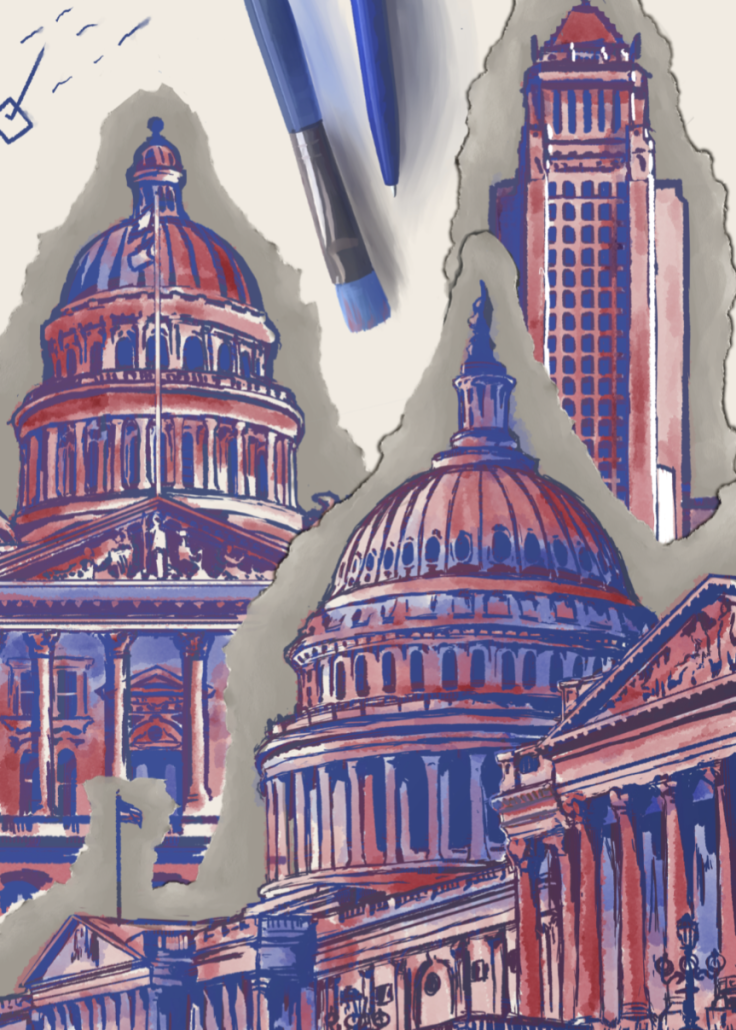PUBLIC DISCLOSURE
Meet the law that stands up to credit fraud
It’s time to get to know our laws — whether local, state or federal — a little better and protect ourselves.
It’s time to get to know our laws — whether local, state or federal — a little better and protect ourselves.


At least once a week, if you walk around campus past midnight, you might see a girl walking up to the Price School of Public Policy with her thermos of tea in her hand. She’ll stop and sit down on the wire bench across from the building, looking up at its flashy front door with the two thick columns proudly bearing the school’s name. It’s become a little ritual for her after three semesters — it reminds her of why she came here. About the conversations she loves to have in its classrooms; about where she might go as a journalist; a future lawyer; a policymaker — a person.
And, as cheesy as it sounds, one day that girl turned on her heel and got hit with an idea to spread that dialogue around campus. It’s me (hard guess, I know), so to you I say, “Welcome to ‘Public Disclosure’” — the column to get to know our government better, straight from the pen of an overzealous but very proud public policy major.
That school, its professors and the classmates that inspired this column is by far the thing I count on the most at USC. When everything else in my life is a dumpster fire of smothered-over anger issues, a Swedish Fish addiction and a painful amount of romantic naïvete, they’re what make me get up in the morning.
That school is the place that’s shown me the truth about policies, laws and protections that our government affords us — many that rarely get publicized or explained well enough by broadcast networks for people to debate and discuss.
And I’ve decided that you shouldn’t have to be a Price major to be equipped with this knowledge — the hundreds of millions of people who will flock to my articles, especially you, deserve to know about them. If universities like ours are supposed to be bastions of learning — in addition to being a nursery for unregulated alcoholism — well then, damn it, we shouldn’t keep the former to ourselves! There’s too much at stake.
Call me a fangirl, bored, a policy wonk or a person who’d like to turn this whole country’s political discourse into her “Government and Business” classroom — where we’re all filled with awareness and understanding about how a local, state or federal law can actually help protect real people. And perhaps, some thoughts on how we can build on them to make it better.
So, keep an open mind, and challenge your most basic assumptions. I’ll throw in some jokes as well.
The 1974 Fair Credit Billing Act
With the economy ranking as the top issue facing our country for most adults, credit and personal finance is a great place to start broadening our knowledge — and to be aware of an important legal protection. Gen Z consumers in the United States are the most credit active than anywhere else in the world, with 66% of us having some sort of active financial product and about 50% of us having at least one credit card.
For most, including myself, that little three-ish-by-two-ish rectangle sitting in our wallets is the first common credit experience we’ll have, as well as a gateway drug to buying Squishmallows and Lego Botanicals off of Amazon in staggering amounts.
Of course, implicit in an economy with 191 million Americans having at least one credit card, there’s going to be foul play — with younger generations like millennials actually more likely to report losing money to fraud than people 40 and over. According to the Federal Trade Commission, the year 2021 alone saw over 2.8 million people become the victim of fraud — and I’d wager that you or someone you know might be one of them.
But the 1974 Fair Credit Billing Act is one of our most important safeguards when it comes to being internet-mugged and identity-jacked, because of a great provision: If you challenge a large unauthorized purchase, wrong charge amount, inaccurate statement, or even an undelivered or unacceptable good within 60 days on an open-end (something you can draw on repeatedly with no fixed end date) credit account, you are only liable for up to $50 of the damage.
Bottom line — if you take extra care to skim your bill for an error every month before you hopefully pay your balance, you are entitled to get that investigated and fixed by your bank. Even further, while that error is being investigated by your creditor, the law also stops them from taking action to negatively affect your credit standing.
While it might take a while for your credit score to realign from a mistake, it should never be adversely affected by that phishing email scam that you fell for — even though that guy probably didn’t need your social security number just to give you a premium membership to ILoveXxXWomAn.com. You live and you learn.
CJ Haddad is a junior writing about local, state and federal laws we use in our daily lives. She is also an associate managing editor at the Daily Trojan. Her column, “Public Disclosure,” runs every other Thursday.
This site uses cookies. By continuing to browse the site, you are agreeing to our use of cookies.
Accept settingsDo Not AcceptWe may request cookies to be set on your device. We use cookies to let us know when you visit our websites, how you interact with us, to enrich your user experience, and to customize your relationship with our website.
Click on the different category headings to find out more. You can also change some of your preferences. Note that blocking some types of cookies may impact your experience on our websites and the services we are able to offer.
These cookies are strictly necessary to provide you with services available through our website and to use some of its features.
Because these cookies are strictly necessary to deliver the website, refusing them will have impact how our site functions. You always can block or delete cookies by changing your browser settings and force blocking all cookies on this website. But this will always prompt you to accept/refuse cookies when revisiting our site.
We fully respect if you want to refuse cookies but to avoid asking you again and again kindly allow us to store a cookie for that. You are free to opt out any time or opt in for other cookies to get a better experience. If you refuse cookies we will remove all set cookies in our domain.
We provide you with a list of stored cookies on your computer in our domain so you can check what we stored. Due to security reasons we are not able to show or modify cookies from other domains. You can check these in your browser security settings.
These cookies collect information that is used either in aggregate form to help us understand how our website is being used or how effective our marketing campaigns are, or to help us customize our website and application for you in order to enhance your experience.
If you do not want that we track your visit to our site you can disable tracking in your browser here:
We also use different external services like Google Webfonts, Google Maps, and external Video providers. Since these providers may collect personal data like your IP address we allow you to block them here. Please be aware that this might heavily reduce the functionality and appearance of our site. Changes will take effect once you reload the page.
Google Webfont Settings:
Google Map Settings:
Google reCaptcha Settings:
Vimeo and Youtube video embeds:
The following cookies are also needed - You can choose if you want to allow them:
